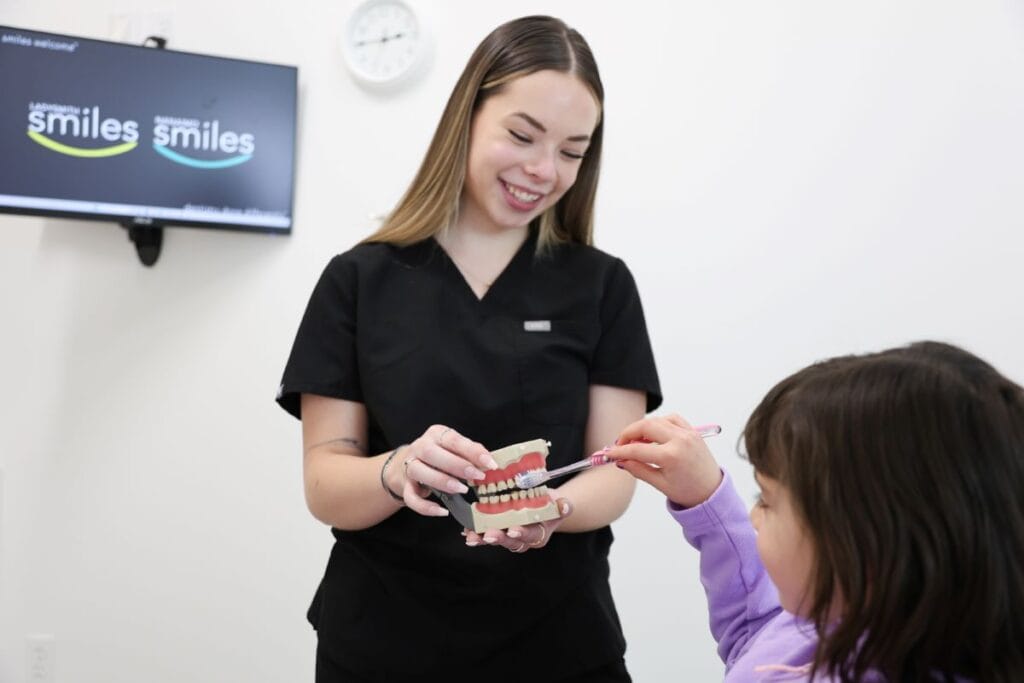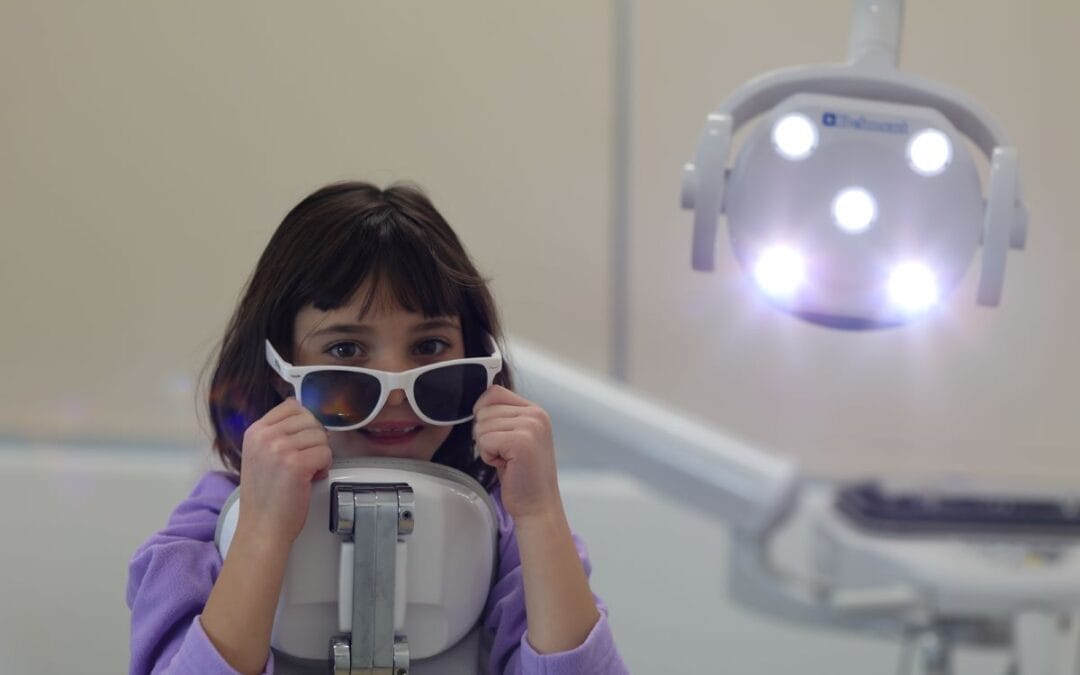Everything you need to know about taking care of your child’s dental health in Ladysmith—from their first dental appointment to pediatric sedation options.
As new parents, it’s completely normal to have a ton of questions about your child’s dental health. You might be wondering when to start brushing their teeth, what type of toothpaste is best, or when you should schedule their first dentist appointment in Ladysmith. It can feel like a lot to navigate for the first time, but don’t worry—our dental team is here to support Ladysmith parents through it all. At Ladysmith Smiles, we strongly believe that starting healthy habits and a positive relationship with the dentist early on is the best preventive, lifelong dental care.
When will my baby’s first tooth come in?
The arrival of your baby’s first tooth is such an exciting milestone! Generally, babies begin teething between five months old up to a year. The first teeth to come in are usually the lower central incisors (the two bottom front teeth), followed by the upper central incisors (the two top front teeth). After that, you can expect the lateral incisors (the teeth next to the front teeth) to emerge, usually around nine to 13 months.
Every baby is different, so there’s a wide range of what’s considered normal. Some babies might get their first tooth as early as four months, while others may not see their first tooth until after their first birthday. The timing of teething can also be influenced by genetics—if you or your partner got your first tooth early or late, your baby may follow suit!
Signs of teething can include increased drooling, fussiness, chewing on objects, and sometimes a slight rise in temperature. While teething is a natural process, if your baby seems to be in significant pain or you have concerns about the teething process, feel free to reach out to us at Ladysmith Smiles. We’re here to guide you and ensure your child’s dental health is off to a great start.
When should I start brushing my baby’s teeth?
Our Ladysmith dentists and dental hygienists recommend starting to brush your baby’s teeth as soon as the first tooth appears, giving your child’s dental health a great head start. Before any teeth come in, you can gently clean your baby’s gums with a soft, damp cloth or a rubber finger brush to help remove any bacteria and keep their mouth healthy.
Once your baby’s first tooth appears, you should begin brushing with a soft-bristled toothbrush and water. A tiny smear of fluoride toothpaste (about the size of a grain of rice) can also be introduced to babies six months or older. Even though baby teeth are temporary, caring for them is essential for preventing cavities, promoting proper oral development, and establishing your child’s dental health habits that will last a lifetime. As your child gets older and more teeth come in, you can gradually increase the amount of toothpaste to a pea-sized amount. Be sure to assist with brushing until your child is old enough to do it independently, usually around the age of eight.
When should my child see a dentist for the first time?
It might surprise you, but your child’s dental health journey should begin with a visit to your Ladysmith dentist by their first birthday! The Canadian Dental Association (CDA) recommends booking your child’s first dental appointment within six months of their first tooth appearing or by age one—whichever comes first.
Early dental visits are crucial for preventing tooth decay, establishing a positive relationship with the dentist, and setting the foundation for lifelong oral health. During this first visit, our team will check your child’s teeth and gums for early signs of issues, discuss teething, and provide guidance on brushing techniques, fluoride use, and nutrition. It’s also a great opportunity to ask any questions about your child’s dental health and learn strategies to keep their smile healthy as they grow.
How can I prevent cavities in my child’s baby teeth?
Preventing cavities in your child’s baby teeth starts with good oral hygiene habits. Begin brushing your child’s teeth as soon as they appear, using a soft-bristled toothbrush and a small amount of fluoride toothpaste, twice a day for two minutes—once in the morning and once before bedtime. You will need to continue brushing your child’s teeth until they are able to brush them well enough themselves. The CDA recommends brushing and flossing your toddler’s teeth until age three, assisting your child until age six and supervising your child brush and floss until age eight.
It is also recommended by the CDA to limit sugary drinks, especially in bottles or sippy cups—this includes avoiding putting your child to bed with a bottle of milk, which may contribute to tooth decay. Scheduling regular dental checkups for your child is essential for monitoring their dental health and catching potential issues early on. Although recommendations may vary for each patient, we generally recommend scheduling a dental check-up every six months.
Encouraging your child to stop thumb-sucking or pacifier use by age three can help reduce their risk of cavities. These habits can introduce bacteria into the mouth, increasing the overall bacterial load that contributes to tooth decay. Additionally, prolonged sucking can shift teeth, creating hard-to-clean spaces where food and plaque build up, making cavities more likely. Questions? Do not hesitate to contact our team of dental professionals at Ladysmith Smiles—we’re here to help!
Why are thumb sucking and pacifier use bad for my child’s dental health?
While thumb sucking and pacifier use are common soothing habits for young children, they can contribute to poor dental health if they persist for too long. Prolonged thumb sucking or pacifier use can lead to issues such as misaligned teeth, or what our dental team calls “malocclusion,” where the upper and lower teeth don’t fit together properly. This can cause an overbite, underbite, or open bite. Additionally, these habits can affect the development of the roof of the mouth, potentially leading to speech or swallowing issues. Furthermore, continuous sucking can increase the risk of tooth decay, especially if your child is sucking on a pacifier that has been dipped in sugary substances. It is recommended to help your child break these habits by age three to ensure your child’s dental health develops properly while preventing long-term dental concerns.

How can I teach my child to brush their teeth properly?
Teaching your child to brush their teeth can feel like a big task, but it’s an essential step in building lifelong healthy habits. The key? Make it fun and part of their daily routine!
Start by brushing for them until around age three, then guide them as they learn to do it themselves. By six or seven, most kids can brush independently with some supervision. Use a child-sized toothbrush with soft bristles and a pea-sized amount of fluoride toothpaste. Show them how to brush gently in small, circular motions, covering all surfaces—front, back, and chewing surfaces.
To keep it engaging, try playing a toothbrushing song or using a timer to ensure they brush for the full two minutes. If your child needs extra motivation, it might be time to go digital. While classic tricks like singing songs work well, incorporating technology can make brushing more exciting. Check out our top five favorite apps for better oral health!
As they grow, encourage independence while continuing to check in and offer guidance. And don’t worry—when your child visits us for their Ladysmith dental appointment, our dental hygienists, assistants and dentists will review their brushing technique, reinforce good habits, and provide personalized tips to keep their smile healthy!
Related Reading: 9 Books To Teach Your Kids About Oral Health
What should I do if my child knocks out a baby tooth?
First thing you should do is take a deep breath—as parents ourselves, we can understand this can be hard! Baby teeth can sometimes be knocked out prematurely during everyday activities, and there is no judgement. If your child knocks out a baby tooth, check to see if the tooth is completely out or just loosened. If the tooth is fully out, gently clean the area with water and apply a clean cloth or gauze to stop any bleeding. Avoid trying to reinsert the tooth, as it could harm the developing adult tooth underneath. If the tooth was knocked out due to trauma, apply a cold compress to help reduce swelling and discomfort. Either way, we recommend contacting your Ladysmith dental clinic and scheduling a checkup, especially if your child experiences significant pain, swelling, or if the injury was caused by a fall or blow to the face. We can assess your child’s mouth, check for any other injuries, and help guide you on how to care for the area.
Even though it might be upsetting—for both your child and you— keep in mind that baby teeth are temporary and will naturally fall out in time regardless! Losing a tooth early generally won’t affect long-term development of your child’s dental health. It’s all going to be okay!
How do I know if my child’s teeth are developing normally?
At Ladysmith Smiles, we know new parents want to ensure their child’s dental health is on track, and it’s natural to have questions. Most children begin getting their baby teeth around six months old, and by age three, they typically have a full set of 20 baby teeth. If your child’s teeth are following this general timeline, their development is likely progressing as expected.
However, there are a few things to watch for. If your child’s teeth appear significantly crooked, have large gaps, or seem crowded, an early orthodontic evaluation may be helpful—and our dentists can help you refer you to one. Additionally, signs of tooth pain, swelling, or gum infections could indicate potential issues like early cavities or tooth decay. Difficulty chewing, speaking, or an improper bite alignment may also signal developmental concerns that should be checked.
If you’re unsure about your child’s dental development, the best step is to schedule a visit with our team in Ladysmith. We’ll assess their teeth, monitor their growth, and provide guidance to support their long-term oral health.
Your Child’s Dental Health in Ladysmith, BC
Helping your child develop strong dental habits from an early age sets the foundation for a lifetime of healthy smiles. From their first tooth to regular dental checkups, prioritizing their oral health ensures they get the best start. At Ladysmith Smiles, we provide comprehensive pediatric dental care, including routine cleanings, preventive treatments, and can give guidance on pediatric sedation options for children who may feel anxious about their visit.
Not sure when to book your child’s first appointment? Have questions about fluoride, teething, or cavity prevention? Our team is here to support you every step of the way. Learn more about how we can help keep your child’s teeth strong and healthy by visiting our Pediatric Dentistry page or contacting us directly.

